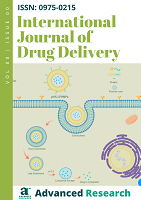Development, intra-gastric performance and pharmacokinetic study of gastroretentive drug delivery system for cefdinir in human volunteers
Keywords:
Cefdinir, Gastroretentive floating tablets, Polyethylene oxide, Radiographic imaging, Pharmacokinetic studyAbstract
The objective of this study was to develop sustained-release floating tablets of cefdinir (CFDN) using effervescent technique to prolong gastric residence time (GRT) and compare their pharmacokinetics with immediate release (IR) and conventional sustained release (SR) tablets. The tablets were designed using CaCO3 as gas-former and three grades of polyethylene oxide as release-retardants and further were evaluated for their physical characters, in vitro drug release and buoyancy studies. The optimized formulation (F3) was found to be physically stable when stored at 40 oC/75% RH for 3 months. In vivo radiographic imaging of F3 revealed a mean GRT of 4.83 μ 0.57 h (n=3). Comparative pharmacokinetic study was performed for F3, IR and SR tablets of CFDN in humans. Based on in vivo performance, the difference between tmax, AUC0-¥, t1/2 and MRT of F3, IR and SR tablets were found to be statistically significant (p < 0.05). The difference between Cmax of F3 and IR tablet was statistically significant, but the Cmax of F3 and SR tablet was not statistically significant. The relative bioavailability of F3 was 1.71 fold to IR and 1.24 fold to SR. This improved bioavailability is due to the combined effect of sustained release and increased GRT.
References
. Chien YW. Oral drug delivery systems.
In: novel drug delivery systems, Chien
YW, editor. Marcel Dekker, New York,
; p. 139ă196.
. Ritschel WA, Kearns GL.
Absorption/Transport Mechanisms. In:
Handbook of basic pharmacokinetics
including clinical applications, Ritschel
WA, Kearns GL, editors. American
Pharmaceutical Association,
Washington DC, 1999; p. 63.
. Cremer K. Drug delivery: Gastroremaining dosage forms. Pharm. J.
; 259: 108.
. Brahma NS, Know HK. Floating drug
delivery systems: an approach to oral
controlled drug delivery via gastric
retention. J. Control. Release 2000;
(1-2): 235ă259.
. Garg R, Gupta GD. Progress in
controlled gastroretentive delivery
systems. Trop. J. Pharm. Res. 2008; 7
(3): 1055ă1066.
. Xiaoqiang X, Minjie S, Feng Z, Yiqiao
H. Floating matrix dosage form for
phenoporlamine hydrochloride based
on gas forming agent: in vitro and in
vivo evaluation in healthy volunteers.
Int. J. Pharm. 2006; 310: 139ă145.
. Deshpande AA, Shah NH, Rhodes CT,
Malick W. Development of a novel
controlled release system for gastric
retention. Pharm. Res. 1997; 14: 815ă
. Chavanpatil MD, Jain P, Chaudhari S,
Shear R, Vavia RR. Novel sustained
release, swellable and bioadhesive
gastroretentive drug delivery system for
ofloxacin. Int. J. Pharm. 2006; 316 (1ă
: 86ă92.
. Hwang SJ, Park H, Park K. Gastric
retentive drug-delivery systems. Crit.
Rev. Ther. Drug Carrier Syst. 1998; 15
(3): 243ă284.
. Seth PR, Tossounian J. The
hydrodynamically balanced system, a
novel drug delivery system for oral use.
Drug Dev. Ind. Pharm. 1984; 10: 313ă
. Harrigan RM. Drug delivery device for
preventing contact of undissolved drug
with the stomach lining. US Patent
October 25, 1977; 4055178.
. Whitehead L, Fell JT, Collett JH.
Development of a gastroretentive
dosage form. Eur. J. Pharm. Sci. 1996;
(Suppl): S182.
. Kawashima Y, Niwa T, Takeuchi H,
Hino T, Itoh, Y. Hollow microspheres
for use as a floating controlled drug
delivery system in the stomach. J.
Pharm. Sci. 1992; 81: 135ă140.
. Chen J, Blevins WE, Park H, Park K.
Gastric retention properties of
superporous hydrogel composites.
J.Control. Release 2000; 64 (1-3): 39ă
. Gröning R, Berntgen M, Georgarakis
M. Acyclovir serum concentrations
following peroral administration of
magnetic depot tablets and the
influence of extracorporal magnets to
control gastrointestinal transit. Eur. J.
Pharm. Biopharm. 1998; 46 (3): 285ă
. Perry CMS, Lesley J. Cefdinir: a review
of its use in the management of mildto-moderate bacterial infections. Drugs
; 64: 1433ă1464.
. Julie LC. PhysiciansÊ Desk Reference,
th ed. PDR Network, Montvale, 2011;
p. 1298-3000.
. Ramesh B, Kishan V. Development of
gastroretentive drug delivery system for
cefuroxime axetil: in vitro and in vivo
evaluation in human volunteers.
Pharm. Dev. Tech. 2012; Early online,
-8. DOI:
3109/10837450.2012.660698.
. Chen GL, Hao WH. In vitro
performance of floating sustained
release capsule of verapamil. Drug.
Dev. Ind. Pharm. 1998; 24: 1067-1072.
. Wagner JG. Interpretation of percent
dissolved-time plots derived from in
vitro testing of conventional tablets and
capsules. J. Pharm. Sci. 1969; 58:
-1257.
. Higuchi T. Mechanism of sustainedaction medication: theoretical analysis
of rate of release of solid drugs
dispersed in solid matrices. J. Pharm.
Sci. 1963; 52: 1145-1149.
. Korsmeyer RW, Gurny R, Doelker E,
Buri P, Peppas NA. Mechanisms of
solute release from porous hydrophilic
polymers. Int. J. Pharm. 1983; 15: 25-
. Ritger PL, Peppas NA. A simple
equation for description of solute
release II. Fickian and anomalous
release from swellable devices. J.
Control. Release 1987; 5: 37ă42.
. Mathews BR. Regulatory aspects of
stability testing in Europe. Drug Dev.
Ind. Pharm. 1999; 25: 831ă856.
. Tadros MI. Controlled-release
effervescent floating matrix tablets of
ciprofloxacin hydrochloride:
Development, optimization and in vitroă
in vivo evaluation in healthy human
volunteers. Eur. J. Pharm. Biopharm.
; 74: 332ă339.
. Swati CJ, Amit JA, Sudhir VP,
Bhanudas SK, Aniruddha RC.
Formulation and evaluation of
gastroretentive drug delivery system of
propranolol hydrochloride. AAPS
Pharm. Sci.Tech. 2009; 10 (3): 1071-
. Safaa SEG, Viviane FN, Ahmed NA.
Optimization of acyclovir oral tablets
based on gastroretention technology:
Factorial design analysis and
physicochemical characterization
studies. Drug Dev. Ind. Pharm. 2011;
(7): 855ă867.
. Zhang CL, Jiao JJ, Wu YN, Song JQ,
Gao WZ, Ma DL, Lou JS. Study on
pharmacokinetics and bioequivalence
of cefdinir dispersible tablet in healthy
chinese volunteers. J. Bioequiv.
Availab. 2011; 3(6): 114-117.
. Shargel L, Pong SW, Yu ABC. Applied
biopharmaceutics and
pharmacokinetics 5th ed. Mc Graw Hill,
New York, 2005; p. 435-475&169-176.
. Banker GS, Anderson NR. Tablets. In:
Lachmann L, Liberman HA, Kaing JL,
editors. The theory and practice of
industrial pharmacy, 3rd ed. Varghese
publishing house, Mumbai, 1987; p.
-299.
. Chiao CSL, Robinson JR. Sustainedrelease Drug Delivery Systems. In:
Gennaro AR, editor. Remington: The
Science and Practice of Pharmacy,
th ed. Vol. 2, Lippincott, Williams and
Wilkins, Philadelphia, 2000; p.1660ă
. Cheong LLWS, Heng PWS, Wong LF.
Relationship between polymer viscosity
and drug release from a matrix system.
Pharm. Res. 1992; 9(11): 1510-1514..





